| |
Tuesday, February 26, 2008, 9:02 PM Strange JapanPosted by stefanie One of my childhood neighbors died recently, giving me occasion to go shopping for a sympathy card. I stood at the very small greeting card display in our local stationery store for a good while before I concluded that they had no sympathy cards. Not that they had run out, but that they simply didn't carry them. Prior to then, it hadn't occurred to me that the Japanese wouldn't send sympathy cards upon someone's death, but that appeared to be the case. I asked some of my students about it later, and was quite surprised by their answer. We've never heard of sympathy cards, they said. We send telegrams when people die.
Telegrams? The things Western Union stopped sending about two years ago because technology had rendered them obsolete? As it turns out, telegrams are used frequently in Japan to acknowledge major life events. Deaths, births, marriages, retirements ¡½ all are occasions for telegrams. You can even choose special papers for your messages or stuffed animals to accompany them. And, ironically, you can order them on the internet.
[ 1 comment ] permalink
Monday, February 25, 2008, 12:34 PM Strange JapanPosted by matthew It's always amusing to see English — and made-up "English" words — in Japanese brand names and advertising. They mean well, but often miss the connotations of the English they choose. For example, there is a line of car accessories called "Blang". My reaction? "Past tense? What is that, like last year's style?" It's actually a pretty neat word, but alas, I was not the first to think of it.
Friday, February 22, 2008, 8:34 PM Strange JapanPosted by stefanie Parking in Japan (well, in Kitakami anyway) is an interesting thing. There are lots and garages, of course, but these seem to be mostly used for daily parking or at shopping centers. There aren't meters anywhere, which sort of makes sense if you consider that streets here are quite narrow ¡½ why invite people to clog the space available for traffic to flow? The lack of meters isn't a deterrent, though. It's common practice to simply pull over to the curb and leave your car there while you run into the store to take care of business. Everyone just drives around you.
For someone used to restrictions on on-street parking, this just seems kind of wrong. In fact, I avoided doing it for the first couple of months that we had the car because I felt like kind of a jerk doing it. "I'm just leaving my car here in the road while I get the dry cleaning! Yes, I know the road is one-and-a-half lanes wide, but just go around!" Now that I'm used to it, I kind of like it. Everyone knows that's what you do, so no one's trying to run you over, giving you the stinkeye, and/or honking at you. And it's nice to be able to stash the car and run a quick errand without hunting for parking.
The random car-leaving is especially interesting in light of the fact that to even own a car in Japan, you must prove that you have a place to park it. You have to tell the dealer where your space is, then he has to provide details about the space, like location, to the police so that they can verify that it is, in fact, your space. Only then can you actually buy the car. So, once you've proven that you have a place to park your car, you can . . . park it anywhere you like.
[ 3 comments ] permalink
Thursday, February 21, 2008, 1:59 PM GeneralPosted by stefanie Winter festivals are quite popular in Tohoku, especially in places like Hokkaido and Akita, where a lot of snow falls. On Saturday, we went to the festival of Kamakura in Yokote, Akita Prefecture. Kamakura are huts made out of piles of hollowed-out snow. Inside the large ones, there are altars to honor the water god. People present offerings of sake, mikan, and rice cakes and ask for plentiful rain during the planting season. At night, local children sit inside the kamakura and invite passersby in to eat grilled mochi and drink amazake. It's a very happy thing to walk among the community of snow huts and chat with the children inside. We started our day with a visit to Yokote Castle. The path to the castle was lined with unlit kamakura. 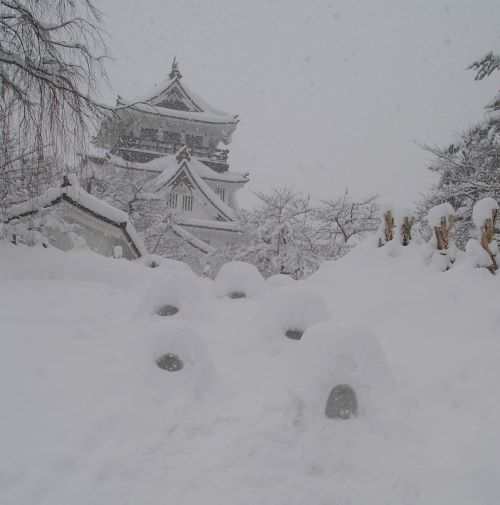 The festival really got underway after dark, when the candles could be lit, making the kamakura glow. 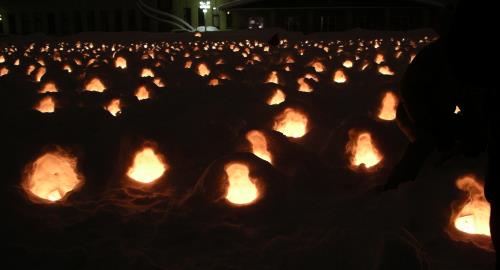 Of course, we accepted an invitation for mochi and amazake. 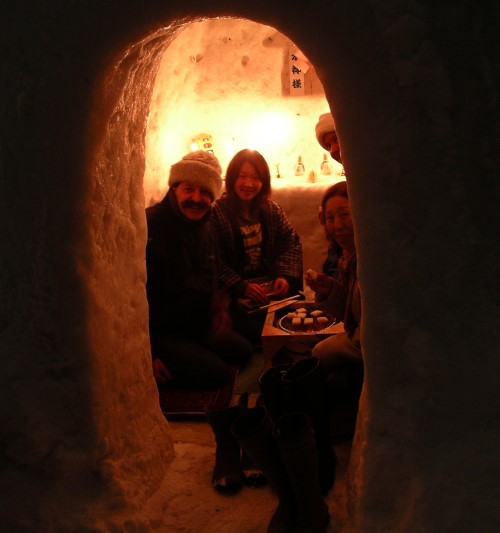 Even for a kamakura, you have to take your boots off in the genkan ¡½ you don't want to get snow on the blankets lining the floor.
Tuesday, February 19, 2008, 1:07 PM GeneralPosted by stefanie I turn 33 this June. According to the Japanese age system, I'm already there and therefore in need of protection. For women, 33 is a major yakudoshi, or "age of calamity," as one reading of the number 33, san-zan, means "horrible" or "difficult." (For men, the age of major calamity is 42 because one reading of the number, shi-ni, is a homophone for the Japanese word for "death.") The year before ( maeyaku) and the year after ( atoyaku) one's yakudoshi are also unlucky years. So basically, the most unlucky years of my life span the entire time we're living in Japan. Awesome. My yakudoshi luck made itself apparent at noon on Sunday. A few weeks ago, I had signed up to participate in our area shrine's yakudoshi ceremony. Two hours before the ceremony, a couple of the community leaders came to the house with the following explanation for how things would go down: "You'll be first because you're the only thirty-three-year-old. Also, and we're really, really sorry for the late notice, but could you give a speech? It can be easy! We're really sorry to tell you this now. Thank you so much. Did we mention that we're sorry about springing this on you two hours before the ceremony?" One frenzied phone call to my Japanese teacher and a consultation with the neighbors across the street later, I had a short, sweet speech prepared. At the ceremony, a Shinto priest prayed for the good health and fortune of the people celebrating their yakudoshi.  Members of the community gave those of us participating in the ceremony red hats after the blessing. 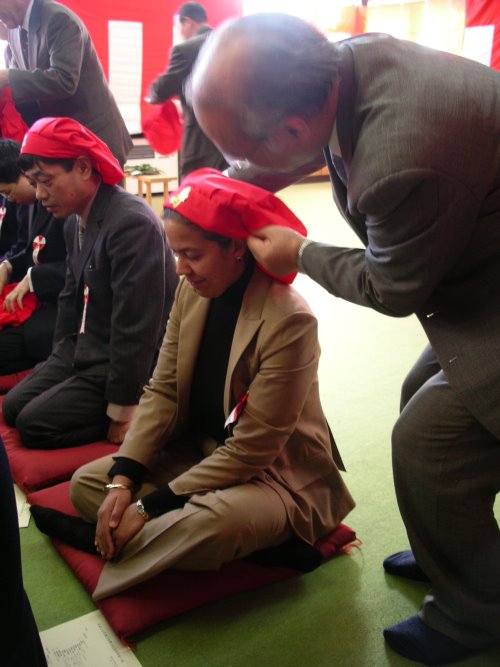 Once the ceremony had concluded, the community members and celebrants had a party with lots of drinking, eating, and well-wishing. My speech went very smoothly, perhaps helped along by the well-wishers plying me with beer. The community leaders made the forty-two-year-olds and me (and Matthew, just for kicks) dance a traditional dance. 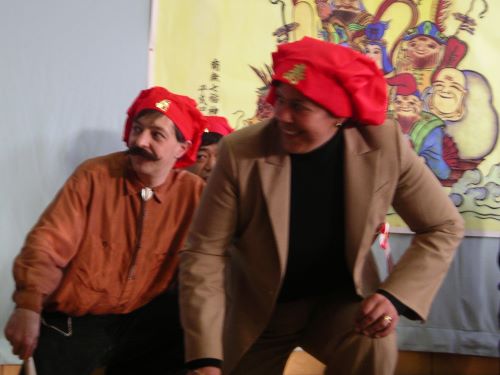 It was a very special day, and we had a great time.
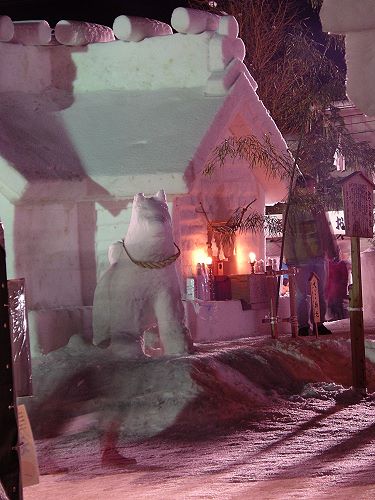 A giant snow dog stands as a guardian against thieves from the spirit world. By chance, it seems the camera even captured a ghostly thief in the foreground.
Here's another manhole cover, this time from Yuzawa. You can see Inukko Matsuri represented by the dog and shrine in the lower right corner. 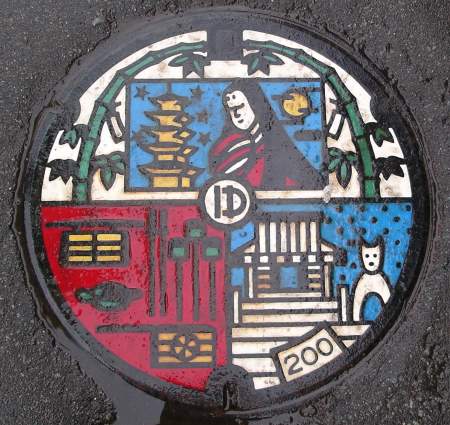
What could possibly say "Happy Valentine's Day" better than two cans of beer? How about two cans of beer decorated with a ribbon and a rhinestone heart? 
These lanterns dotted the hillside in a park overlooking Inukko Matsuri, in Yuzawa City, Akita. 
Yaki = Grilled = Food... Right?
At Inukko Matsuri, we decided to enjoy some of the festival food for dinner. But what to have? Pretty much every food item available was something yaki - grilled or fried. There was takoyaki (octopus in fried balls of batter), yakiniku (grilled beef skewers), okonomiyaki (fried pancake with toppings), ikayaki (grilled squid), yakizakana (grilled fish), yakisoba (fried noodles) with or without medamayaki (fried egg), yakimochi (grilled mochi), yakitori (grilled chicken skewers), and yakidango (grilled rice flour balls). Other foods such as nabeyaki udon (fried noodle hot-pot), sukiyaki (simmered morsels), teriyaki (meat or chicken with a sweet sauce) and yakiimo (grilled sweet potato) were not represented at the festival. As we considered our options, we saw a tent set off from the others a little ways, advertising dondoyaki. What kind of food might that be? We'd never heard of it, but thought it would be best to check it out before deciding what to eat. As we approached the tent, it became apparent that food was not involved. They actually seemed to be collecting pine branches. Then it dawned on us that yaki isn't just for food - it also means burning things. In fact, they were collecting new year's decorations to burn in a bonfire as part of a Shinto ceremony. 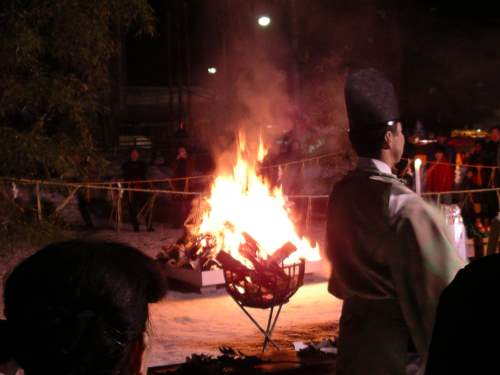 Needless to say, we opted for some of the other yakis for dinner.
Back Next
|
|











 Calendar
Calendar




